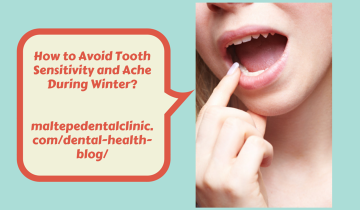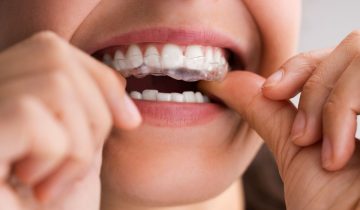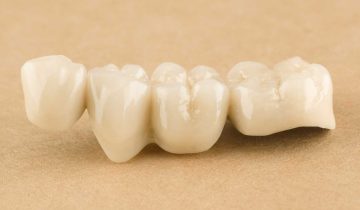Last updated on May 20th, 2024
The thinning enamel layer or receding gums are two leading immediate reasons for sensitive teeth pain. There may be various factors leading to those reasons. As for the treatment, seeing your dentist, of course, should be your first resort.
However, you might still want to relieve the pain and discomfort until the next time you visit the dentist. The good news is there are ways for you to do it. In this blog, you will read about the remedies for sensitive teeth pain at home. Besides, you can find short and clear answers to some of the most common questions regarding the issue.
What Causes Sensitive Teeth Pain?
There are ways to get rid of sensitive teeth pain. However, a clear understanding of the causes of sensitive teeth pain can greatly contribute to the solution. Many patients first notice the problem when they feel their teeth suddenly sensitive to cold or hot foods and drinks. But let’s not forget that cold or hot cannot be the cause of your sensitivity. You should shift your focus to the origin of the problem.
As stated above, worn-down enamel and receded gums are more likely to count as the roots of the problem. So, the substantial solution would be restoring such issues primarily. However, it is also very common that people have one tooth suddenly sensitive at night. The feeling is more like soreness or prick hitting suddenly for a short time, rather than an ache for a longer period. In such cases, you might wish to have a quick fix for the pang on your tooth.
Why Are My Teeth Sensitive All Of A Sudden?
Here are some common reasons for sudden sensitive teeth pain that many people suffer from.
Teeth Whitening
The overuse of some teeth bleaching products generally causes sensitivity. Though there are some more advanced applications including the laser activation of the bleaching agents, research shows that avoiding postoperative sensitivity is not yet possible.
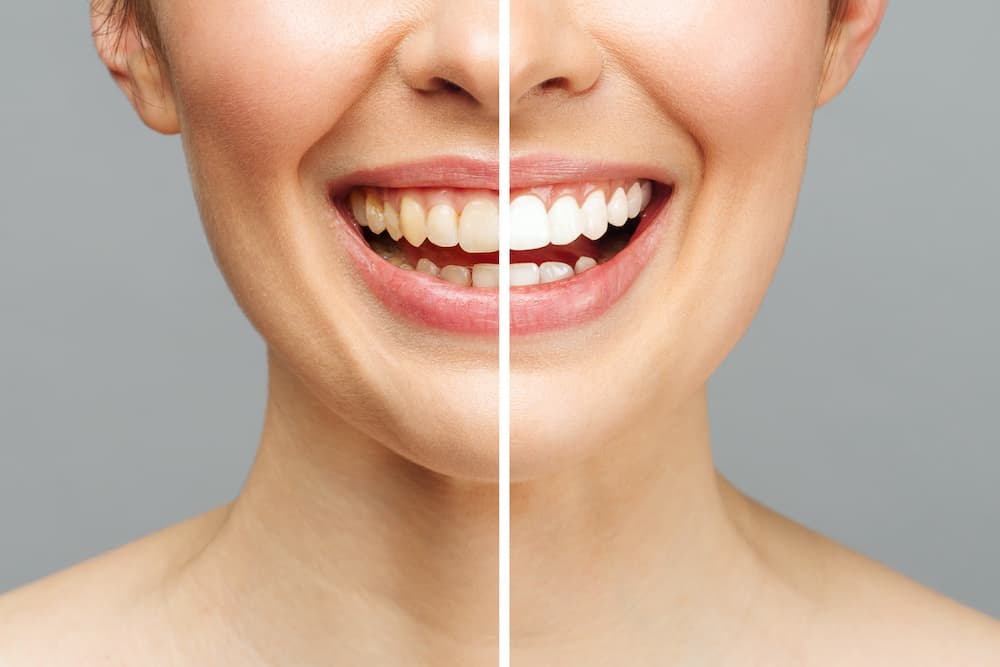
Diet
Acidic drinks and hard foods can easily damage the outer layer on the tooth surface, which usually leads to sensitivity and dental erosion. Concerned with the increasing consumption of acidic food and drinks recently, research has shown that there is a significant correlation between the participants’ habit of drinking soft drinks and dentin exposure, which is a potential cause of tooth sensitivity pain.
Brushing Aggressively
Oral hygiene is, of course, very important. But you should still be gentle with your teeth while brushing them. Aggressive brushing can cause serious erosion of the enamel layer, especially with regular or hard-bristled toothbrushes. Therefore, you are advised to brush your teeth with a toothbrush that has soft bristles so that you can avoid sensitive teeth pain.
Gum Problems
According to the Centers for Disease Control and Prevention, 46% of the people 30 years old or older show the signs of gum diseases. Remembering that receding gums are one of the two leading causes of sensitive teeth pain, taking care of any problem with your gums is of great importance.
Tooth Decays
Decays can give you one of the biggest pains you might ever have in your life. At the earlier stages, you might have no constant tooth pain, but sudden instances of sensitivity, though. Therefore, you should take care of even small cavities as soon as possible. A filling is usually an effective and practical way to avert the problem.
Some Dental Procedures
Some dental procedures like recent tooth work or filling can give discomfort and pain based on sensitivity. The good news is the teeth sensitivity pain after such procedures is usually temporary, but you should still go back to your dentist immediately to discuss an unbearable sensitivity or other complications.
Cracked Tooth
A cracked or broken tooth can result in extremely painful sensitivity. Unfortunately, the agony doesn’t go away in a short time, and thus you should see your dentist as soon as possible. Immediate attention of a dental professional can give sensitive teeth pain relief.
Sinus Problems
Nerve endings of the teeth can be compressed by the inflamed sinus, and it might lead to sensitive teeth pain. Though the swelling of the sinus load grows gradually, the sensitivity might start suddenly after a certain degree.
Cold Weather
When the weather is very cold outside, and it is much warmer inside, your teeth might contract and expand as a response to the sudden change in temperature. These sudden changes might result in sudden sensitive teeth pain in the front teeth especially.
Bruxism
Grinding and clenching the teeth can damage the enamel surface and lead to sensitivity. Although many people sometimes grind or clench their teeth, it gets much more frequent especially when you are under high stress.
How To Get Rid Of Sensitive Teeth Pain?
As you see, there are numerous factors leading to sensitive teeth pain or discomfort. While it happens in time in some cases, it might also occur all of a sudden. Now that you have learned the potential causes, you can move forward to solve the root of the problem.
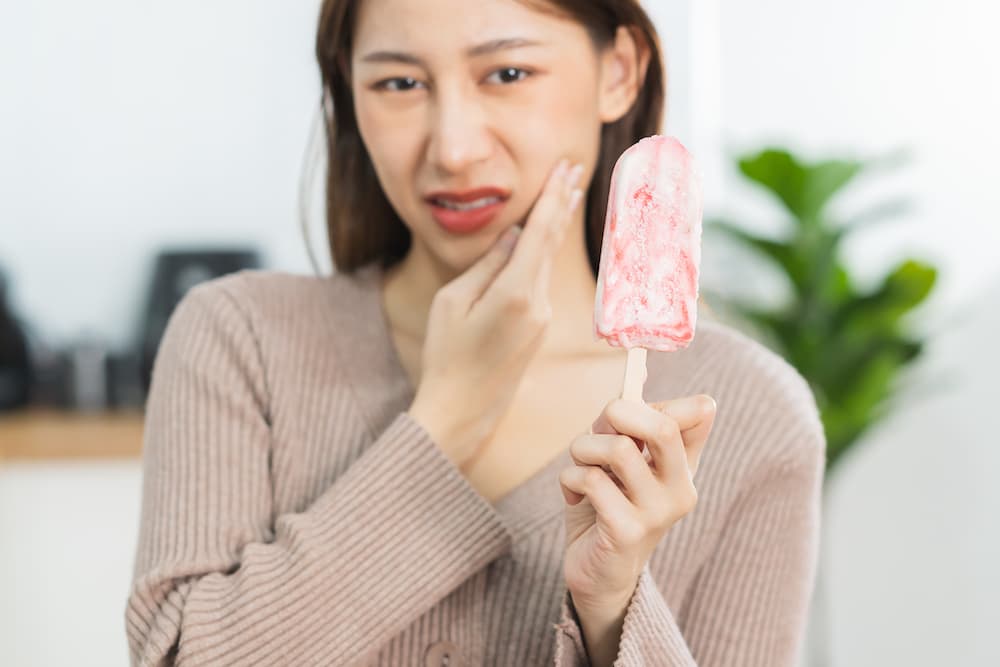
Here are a bunch of ways to relieve the sensitivity and the pain at home until you see your dentist or get to a dental clinic.
How To Stop Sensitive Teeth Pain Immediately At Home?
In most cases, seeing your dentist and taking a professional treatment is the best way for you. However, you can have the pain at night, you might be traveling, or the clinic or the dentist may not be available just as you have sensitive teeth pain. Then you might seek a home remedy to reduce the pain until your meeting with the dentist.
Common home remedies include but are not limited to using desensitizing toothpaste, applying turmeric, salty water, hydrogen peroxide…etc. They have different ways of application and dosage.
FAQs
Here are some frequently asked questions by the patients.
How To Stop Sensitive Teeth Pain Immediately After Whitening ?
As stated above, teeth whitening is one of the factors that lead to sensitive teeth pain. Though the pain and discomfort take only a few days in most cases, you can have sensitive teeth pain relief after whitening by following these steps:
- Avoid cold and hot drinks
- Avoid acidic food and drinks
- Continue using a desensitizing toothpaste
- Brush gently
- Use fluoride products
- Use a straw for drinking
Is There Any Sensitive Teeth Pain Medicine?
Yes, there are sensitive teeth pain relief gels, strips, and creams as well as special kinds of toothpaste.
What Is The Best Toothpaste For Sensitive Teeth Pain?
There are many brands and products on the market, and it is not easy to pick the “best one” as it involves many variables to evaluate. Here is a list of the three popular products for you:
- Hello Oral Care Sensitivity Relief Toothpaste
- Colgate Sensitive Whitening Toothpaste
- Sensodyne Fresh Sensitive Toothpaste
Is It A Good Idea To Apply Baking Soda For Sensitive Teeth?
Yes, it might work for you especially when the reason for your sensitivity is increased acidic flora in your mouth. If you try a mouthwash for sensitive teeth pain relief using baking soda, you can reduce the acid level in your mouth.
Can I Get Sealant For Sensitive Teeth?
Yes, it is one of the most effective ways to get rid of the sensitivity. However, dental sealants should be applied by professionals.
How To Get Rid Of Sensitive Teeth After Eating Lemon?
You should rinse your mouth soon after eating a lemon. Also, chewing a piece of sugar-free gum can help you decrease the acidic flora in your mouth after eating a lemon.
How Can Maltepe Dental Clinic Help?
When you come to Maltepe Dental Clinic to find relief from your teeth sensitivity, our first step is to determine sensitive teeth pain causes giving you that pain. According to the origin of the problem, we can tell you what the possible treatments would be. Here are some common recommendations or treatments we give to our patients:
- Using a desensitizing toothpaste and soft-bristled toothbrush.
- Using sensitive teeth pain relief gel containing sodium fluoride
- Avoiding teeth grinding or clenching
- Certain dental treatments such as a crown, filling, bonding, root canal, or gum craft depending on the origin of the problem.



